The debate about whether to keep horses and mules for survival transportation is about equally divided between those who think motorized vehicles are better and those who believe that horses and mules are necessary in a post-SHTF society. Personally, I tend to believe that they will be valuable assets for work, transportation and trade but I can see the merit of the other side, too.
Should you choose to raise horses and mules for survival, there are a few different breeds that will be good for different purposes.
Travel
As we’ve discussed in other articles, such as this one, horses will be valuable for transportation. There are three that stand out right off the bat. The American Quarter Horse is known for being easy to train, level-headed and sure footed. They can also sprint and, if trained properly, can have good endurance at the walk and trot. Even at the lope, they can cover several miles in a day without needing to stop much.
Quarter horses are also “easy keepers” which means that they tend to maintain muscle mass and body fat without a lot of food. Quarter horses are good survival horses because they can also carry quite a bit of weight and have the endurance and temperament to make good pack animals.
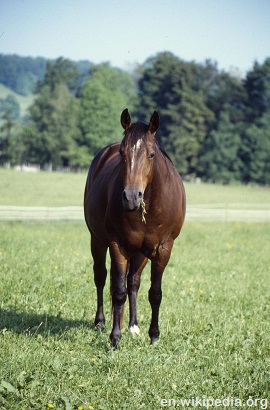
Quarter horses are also extremely versatile and can work on farms cutting cattle. They’re the go-to animal for ranch work for a reason – they can stop on a dime, hold a cow while it’s being vaccinated or branded and are physically built for this kind of work.
Other breeds, such as Arabians, are great endurance animals but require more feed to keep them going. They’re fast and have incredible going power but tend to be flightier and more difficult to handle in spooky or loud situations. They aren’t the best choice for survival animals unless you’re an extremely skilled horseperson and the horse won’t be swapped among less experienced riders. Arabians generally have good feet and may be able to go without shoes.
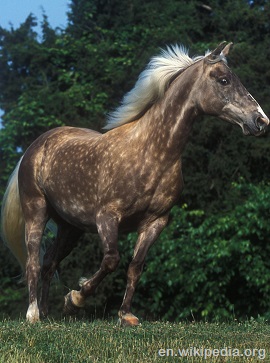
Hands down, if you’re looking for a steady horse for survival with speed, endurance and durability, you want an American mustang. These are wild horses that run free, mostly in the American West and into Canada. They’re often rounded up to prevent overpopulation or so that man can use the land for building purposes and sold at auction for very little money.
Be aware that when adopting a wild mustang, you’re going to have to put a lot of work into taming and training them. You can buy foals that are easier to raise and train but foals will require several years before they’re ready to ride. That’s fine as long as you believe you have that much time. Mustangs can practically live on air, have incredible stamina and strong feet that most likely won’t require shoes.
Mules bred from any of these breeds are also great for travel though there’s a reason that there’s a saying, “stubborn as a mule”. They tend to decide to do things in their own time though they’re great animals and sturdy both for riding and for pack animals. Just remember that you can’t breed mules to mules – they’re sterile and can only be created by breeding a male donkey (jack) with a female horse (mare).
Work
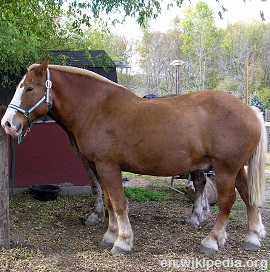
Belgians are compact, stocky horses that are typically 16-17 hands tall and they weigh up to a ton. Because they’re built rock solid from head to tail, they’re up to any heavy lifting or pulling work. Because they’re comparatively compact, they’re good for getting logs out of tight spots. They’re fairly easy keepers, too but will likely require shoes to remain sound.
Clydesdales
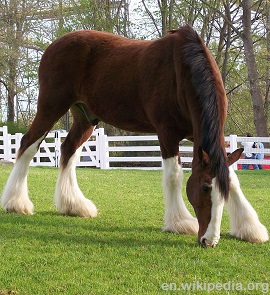
Clydesdales have great endurance but aren’t the best horse for pulling a plow. They can definitely work if you need them to and since they’re also good riding horses as long as you’re not looking for quick speed, I recommend them because they are multi-use.
Percherons
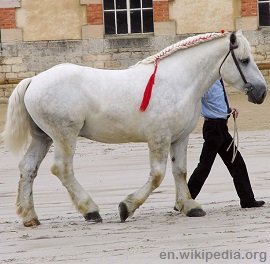
Since Percherons are relatively compact and have strong shoulders, they’re good work horses in both tight situations such as logging and in pulling situations such as plowing. Percherons are not as smooth to ride as a Clydesdale but they’re not as rough as a Belgian. They can cover plenty of ground in a day but they’re not going to do it with the speed of any of the riding horses listed above.
There are most certainly other breeds out there that many may think are supreme to the ones that I’ve listed here. I have personal experience with each of the animals that I’ve discussed above but if you have any other suggestions, we’d love to hear them, along with the logic, in the comments section below.
This article has been written by Theresa Crouse for Survivopedia.


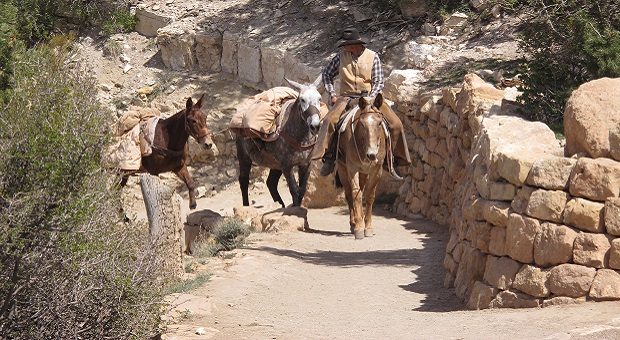

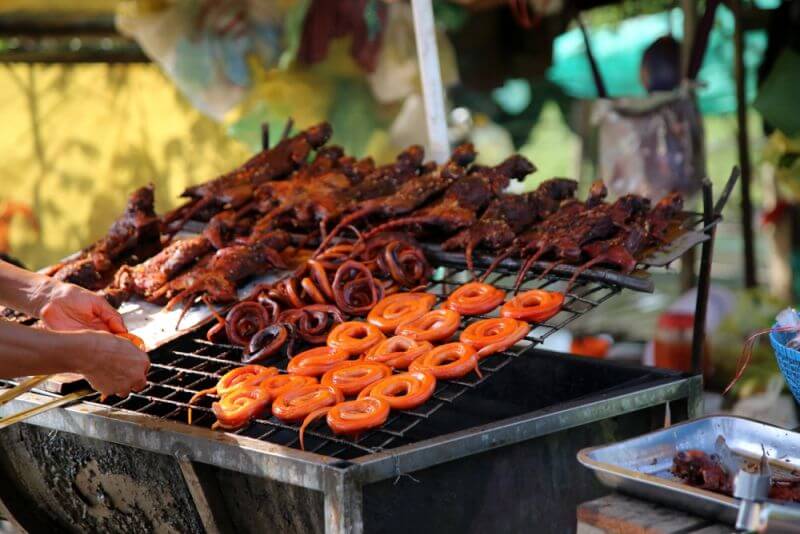

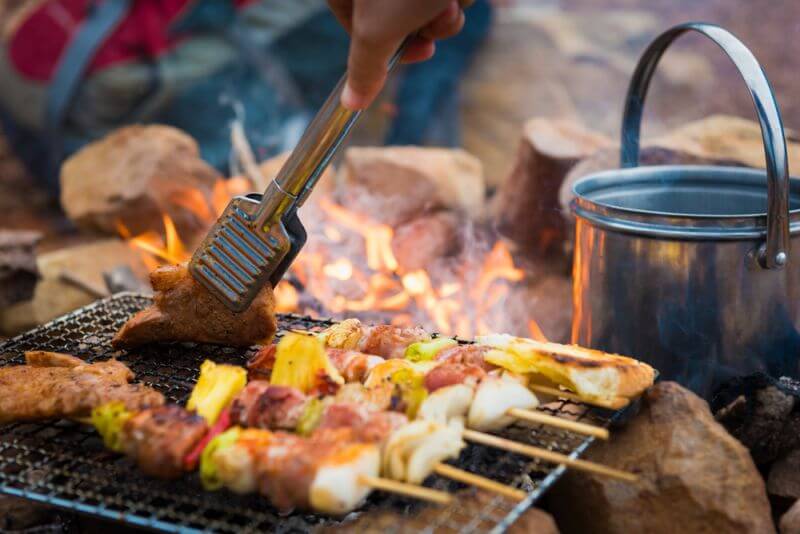
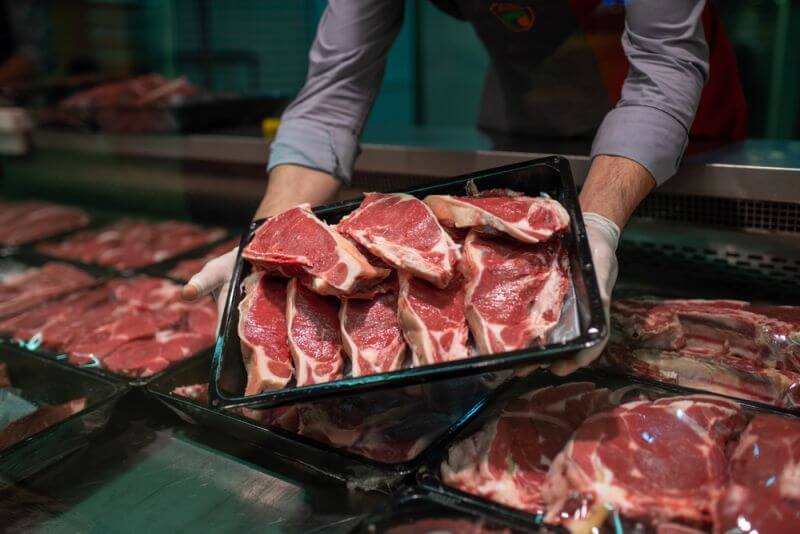

Jud | August 13, 2015
|
I’m sorry but I have to disagree with the quarter horse being one of your suggestions. They are bloodlines are so infused with thoroughbred that they require large amounts of feed. Perhaps if you had more of the traditional lines of quarter horse that wouldn’t be the case. Instead I would suggest a Morgan with Lippett lines (great endurance, strength and very easy keepers) or an Appaloosa which has its heritage with the Nez Pierce. If you’re near Amish country, their horses have a proven track record. As a side note I’d say 99% of the Amish use Belgians for their work horses.
Carol Moore | August 13, 2015
|
I think draft horses are too cumbersome and harder to find for sale. They take a lot of feed and are suitable mostly for farm work. They are so tall that they are hard to mount. There is a small horse that is used to drive, work and ride and has a great disposition and is used a lot with children. It’s the Haflinger breed. They are popular all purpose animals that wouldn’t take large amounts of feed. You also forgot to mention the Morgan horse, an all purpose horse like the quarter horse. Mostly it’s going to be any horse that someone can find for sale that is sound if or when it gets to that.
Polly | August 13, 2015
|
Morgan’s are average height of muscular build, good riding and pulling. You will probably need a team for plowing or heavy loads. Most of the Morgan’s I know are easy keepers, easy riding, and cover distances well. If you look after they feet well, you may not need to shoe them. I’ve had some that were good cow horses as well. Mine were quiet enough that kids learned to ride on them.
Drew M | August 13, 2015
|
I agree with the descriptions in the article but remember “breeds” have been designed by man for particular, narrow purposes. The best SHTF horse is probably a cross-bred of a draft horse for size and strength and your favorite breed of Quarter or TWH or saddle bred. Including thoroughbred mares in the mix can also give you size, endurance and smarts. Paints will look pretty til the SHTF and are already camouflaged in the woods.
Wes EDWARDS | August 13, 2015
|
Hello Theresa I just love your story on Horse’s but my favorite horse is a Quarter horse & Morgan mix that mix will give you a horse for a great endurance,long distance,it will go all day long without water or rest it will also climb up & down high grade as well even at 8 to 9 thousand foot elevation and still don’t have any problems with breathing even riding double with total weight of a bout 500lbs. I was raised on a 3500 acre ranch in Helotis, Texas and we raised Palomino horse’s for show and Quarter horse’s with Morgans horse’s they both have a lot of heart and staying power a Quarter / Morgan mix make a great cutten work horse. well I miss my horse’s and I used to have a Mustang stallion and he was a hand full but a great work & Rodeo horse for cutting & roping, I haven’t had a horse since 1986 and I miss having one I enjoy reading about them and seeing them but I hate seeing people with them that don’t know what they are doing with them I know a man who has a horse here in a neighbor who keeps it in his back yard and stakes it out along the side of the road to eat all day with no water & I have coplained to animal control and they won’t say anything to him about it the shoes are worn out from riding on the road way and the frog of it;s hoof are packed with rocks and mud dryed hard as concreat If i could steal that horse I would take him far away a ranch I know of where he he would be taken care of but I can’t. so any way keep writing good story about horse’s and have a great day Wes.
TPSnodgrass | August 13, 2015
|
Great article! I’ve LONG felt tat we need a few mules for survival transportation. Wife wants a horse, OK, printed out this article for her. I still want a mule for me. I’m stubborn like they are. Sure seems like they are the ultimate Bug-Out “vehicle”, as horses or mules are far quieter than any hydrocarbon fueled “vehicle” would be. Thanks!
Tass Heim | August 13, 2015
|
Blazer horses are know as the “little quarter horse”. They are strong, have excellent feet and legs, and are extremely trainable. Their size makes them very easy keepers. The breed is on the small side with most being 14 hands or under, however, nobody has ever told them they’re small. They are as strong as any QH and really tough.
MK Moore | August 13, 2015
|
I think you’ve overlooked one of the most versatile and over all valuable breeds. The American Morgan Horse. The founding sure, Figure, was born the year George Washington became President of the United States. Morgan’s are extremely easy keepers and enjoy longer than usual, useable lifetimes. They are sound minded (that’s why they are one of the founding breeds on the Quarter Horse registry) sure footed, hard working horses. Their hooves are hard and often do not need shoes. They were bred to be the all round working horse, able to plow the fields all week, harness up to go to market on Saturday, Match race, and an elegant saddle horse all in one. They were a favorite with both Union and Confederate soldiers for their endurance and courage in battle. They were selected for the remount breeding program for the United States Calvary. Pound for pound, they out pull any other breed and many settlers prized them during our western expansion. They are compact and agile, making them well suited for working stock. The Morgan is a part of of American history because it earned it’s place there.
cheri | August 13, 2015
|
I agree with you regarding the Morgan horse. I begin to think about the Standardbred and the enormous amount of staying power they have. I know this because the Amish people use them as their horse of choice. Have you ever been to an Amish village and watched them? They trot for miles and miles at a goodly rate of speed without tiring. Of course, I suppose, it is because they were raised and bred for racing. I think I would choose a Morgan/Standardbred cross. Another excellent horse with a lot of toughness and endurance is the Appaloosa. The horses were bred here by the Nez Perz (sp) Indians. They also have very good feet.
Heidi | August 13, 2015
|
Many Morgans with foundation bloodlines also may exhibit a 4 beat gait, either at a single foot or rack, making them incredibly comfortable to ride. One of the reasons they were so prized during westward expansion is that they have a lot of heart and can be very protective of their rider as well. One of mine mired up chest deep in mud and managed to trudge almost 50 yards through it to get us to safety. Most other horses would have either panicked or would have given up, getting us killed. I’ve owned horses of various breeds for 35 years and this is one of the breeds I most respect for its versatility and heart.
For experienced horsemen in a survival situation, a paso might bear consideration. They have hard feet, are easy keepers, and are not terribly tolerant of riders of whom they do not approve, meaning you don’t have to worry about someone else taking off with your horse. As descendants of conquistador horses, they share many desirable characteristics with the more pure Mustang bands. They are small, 13-15 hands, but can carry heavy loads, including very large men. They do not require special shoeing to exhibit a smooth gait and can be ridden barefoot. Many people with back and hip injuries find the paso gait preferable to all other breeds. Unlike other gaited breeds, those not bred for show are often used for working cattle in addition to making a great all around family horse. However, they are not for inexperienced horsemen. Pasos (paso fino, Peruvian paso, trote y gallope, and trocha y gallope horses) are characterized by brio – controlled fire that the horse uses to benefit the rider – which can be intimidating to a neophyte equestrian and dangerous if mishandled. This is a very loyal horse that, if asked, will literally go without complaining until it drops under its rider.
Chris Sherman | August 13, 2015
|
For and article about “mules and horses for survival,” this treaded incredibly lightly about mules!
Jim Svoboda | August 13, 2015
|
I agree that the Percheron is an excellent choice. Howerver, I think the best choice for a survival work/riding animal would be a Walkaloosa/ QuarterHorse/Percheron crossed with a standard Jack donkey. You get the strength, intelligence, & smooth gait of a mule mixed with the power, size & carrying capacity of the Percheron. Add the the qualities you’ve already stated about the QuarterHorse with the gait, the hard mustang hooves of the Walkaloosa(Appaloosa/Walker cross) and camoflage of a spotted Appy and you’ve got the perfect “bug out” vehicle! They’re much better than the “gas” eaters, they eat “grass”!!!
KDH | August 13, 2015
|
I’m With you MK Moore!!
I have Trimmed and Shod horses for 22 years. Rode, Driven, Packed, Trained, and worked with horses back to my earliest memories. At one time or another, I’ve had hands on with most breeds. Currently Morgans is the only breed I own! I love them and don’t plan on ever changing. Great all around animals!!
KDH
RC | August 13, 2015
|
All of the above is true, both in the article and in the comments. Yet, I think that you’ve omitted a gem of an animal: the Arkansas Mammoth Jack mule. It can jump over high obstacles so, if bad guys are after you in a Humvee, you just head for tall shrubs, jump over, and you’re clear. Also, it is outstanding for guarding livestock; not only is it very alert, but it can beat the heck out of a mountain lion. Aside from that, it is good for hauling cargo. It truly belongs on the list of reliable equines.
Jim Svoboda | August 13, 2015
|
I agree with Mr. Moore about the Morgan being a good choice, but to give a Morgan more speed, savvy, and a smoother gait cross a mare with a standard Jack donkey. You would have a great survival animal!
JJ | August 13, 2015
|
Quarter horses are fast, but only for a quarter mile (hence the name). Someone posted regarding the Morgan horse. GREAT choice. Arabs are also great and don’t require the food mentioned in the article. They ARE, however, a bit of a handful. Mules are good but they are sterile hybrids. And the author has stated that Tennessee Walker will get you there, albeit more slowly. Here I think she is incorrect. Tennessee Walking Horses move quickly, consistently, and quietly for long distances. They are easy to ride. However, my horse of choice in bad times would be a Missouri Fox Trotter. Easy keepers (ie, not to much food, grass by the side of the road would be enough in bad times), extremely agile and smooth, and sturdy enough to do almost anything asked of them. Quick, easy-to-ride and even tempered. Easy to train to cart, brave enough to go anywhere, sturdy enough to haul your kids. The ideal horse in good times and bad.
Perdido | August 14, 2015
|
I am having some difficulty with Ms Crouse’s take on the best survival horse. I do however emphatically agree on a couple judgements.
A mule is a very good idea, they keep easy, they’re alert as a watchdog, very good for burden and surefooted. There is a current trend to breed gaited mules. But don’t get too swept up – they ride wonderfully but when they don’t want to do something…. you’ve still got a mule.
Jumping mules are simply awesome. If you’ve got a biddable Mammoth that can jump you’ve pretty much removed all obstacles to traveling as the crow flies..
And they’ll go at night- something a lot of horses can’t be relied on to do.
Mustangs are just out of this world if you can get one with a good nature. Caution here, they can be cantankerous and won’t tolerate abuse. They have awesome feet, they seem to be able to live on sawdust, little water and they can lope all afternoon. They’ll bear like a mule. And they are typically healthy. This is a major concern as veterinary care can be very, very costly.
Ms. Crouse didn’t mention Missouri Foxtrotting Horses. That’s a major oversight.
The MFT is the chosen breed of the Nat’l Forest Service – for good reason.
They are excellent on cattle. They are excellent in the woods for work under saddle or harness. They will pull wagons and buggies.
They “foxtrot” which is a way of moving that is very smooth and VERY fast. The horse is (figuratively) walking with the front legs and trotting with the back legs. They can move like this (fast) for hours. They were the favorite of doctors on rounds, tax collectors and delivery men.
Importantly, they are “easy keepers”, which means they are typically healthy, strong hooves, cheap on feed and well mannered, level headed.
And they don’t cost a fortune.
You can’t go wrong with a Tennessee Walking Horse. They tend to be bigger which is nice on the start but older folks may find this off putting after getting on and off a half-dozen times a day. But they really cover the ground when needed and don’t exhaust you in the process.
Keep in mind if you get a bigger horse you’ve got a lot more animal. But even smaller horses are dangerous animals because they are ever unpredictable, lightning fast and strong.
Don’t buy into the “gentle giant” mantra. They are gentler- but they’re still big prey animals. If they have the choice of going over you or getting eaten, you’re bug spatter.
At our corrals everyone is taught this lesson:
“There are only two kinds of horses in this world:
The ones that have hurt you and the ones that are going to hurt you.” …
Keep in mind horses get a lot of the same ailments humans do. You or visitors can give your horse a cold, flu and other stuff. Pick your horse from a healthy herd…
Horses can be pretty pricey. But if you shop, pay a little more and follow the advice of a reliable friend or owner you’ve got a much better chance on not getting saddled with a flighty or worse- treacherous animal. Yes, horses can be demonically treacherous. Remember there’s too many good horses out there to stay with a bad one. We have a tendency (women are worse about this- sorry, but true) to get emotionally attached to the wrong animal. Withhold your affection and commitment until you know you’ve got a deserving animal.
You might get that one in a million for $300, but the odds are against you. Find out what a typical sane horse of the type you’ve chosen. Then find a good one and pay the going rate. There’s lots of cheap horses out there .. for good reason.
Finally, if you can get and keep a horse or mule I strongly recommend it. They have personalities, and “presence”. They add enormously to your life.
They are not cars. They have to be managed twice every day. If you think you’ll have a manageable, reliable, gentle horse after leaving it in the pasture for 12 of the year, think again.
We use ours for big game hunting in the mountain west. We go big distances and haul out big animals. But they’re trained for these tasks – some horses are deathly afraid of the smell of blood. You can’t pack out an 800# elk if you’re horse won’s stand still long enough to put a quarter-section in his pack…
But,
If you have to bug out and have a good horse or two you’ll get where they ain’t with a lot more of your stuff.
Good luck.
Roland | August 14, 2015
|
MK Moore said it first and I agree. Morgans are probably your best all around horse. Not quite as big as a Clydesdale but an even tempered work/riding horse better than a Morgan doesn’t exist. Horse’s in general, can run full out for about a half a mile. Please note the lengths of races for Thuroughbreds, horse’s bred to run, is limited to 1 1/2 miles. Most are shorter and your Quarter horses will do about 1/2 mile tops. Those long posse chases of the old westerns were make-believe. For cutting cattle and slow overland rides a Quarter horse is fine but not for the plow or wagon hauling or pulling tree stumps to clear land. Clydesdales and Belgians are a little too finicky. Arkansas mules whether Jack or Jenny are about impossible to beat. Breeding is a different matter.
Alysha Godfrey | August 14, 2015
|
Consider the Haflinger – they are super easy keepers, one can do ~2/3 of the work of a full sized percheron, easy to train, 13-15H, can carry a 6’4″, 240 lb man over the continental divide with little effort (spoken from experience), strong hooves, stout animals when you get them in the “old style”. We have worked Hafligers on our farm beside Percherons and Percheron mules for 13+ years and they have taken the favored spot for an all around horse on our TX farm, even over Texas’ beloved QH :)>. Drive them, ride them, farm them, show them, jump them, do dressage with them, work cattle with them, you name it … you can do it with a Halfinger! Amazingly enough too, go to Amish areas of OH and pick them up for under $3000 most of the time, sometimes under $1000 depending on the area an the time of the year. These little Haflingers are a hidden treasure with a great history of being docile and used in times of war to transport equipment due to their quiet tempers, ease of training, ease of keeping weight and unfortunately for food for soldiers as well. Check them out!
Pingback:Mule And Horse Breeds For Survival | TheSurvivalPlaceBlog | August 14, 2015
|
G. Hughes | August 14, 2015
|
i have been around horses and working cattle ranches all my life. my brother in law managed the Morrison Ranch (Windmill Ranch) that ran between Sedona and Flagstaff for decades. Those ranch horses, all good Quarter Horses could go 25 miles a day with no problems. and much of this country is rough. They are properly trained for this endurance. this was at a walk/trott, much of it at the trott.
I used one of my Quarter Horses to enter an endurance race for the fun of it. It was a 25 mile race in Flagstaff, AZ with largely Arabian entries. We did wonderfully as she was trained properly for ranch work. We passed every Vet check point with ease.
Pingback:Are Horses and Mules Necessary For Survival? - Daily Survival Pro | December 13, 2015
|
Pingback:15 Lost Survival Tips From The Cowboys Who Wandered The West – With Illustrations | Ask a Prepper | January 12, 2016
|
Pingback:15 Lost Survival Tips From The Cowboys - Bio Prepper | January 24, 2016
|
Pingback:15 Lost Survival Tips From The Cowboys – Prepper Dome | June 25, 2016
|
Polvo | September 30, 2017
|
Thank you for taking the time to create this helpful article. Whether or not you strive to write more densely with factual content organizing the script, so to speak, in doing comparative writing such as this, it would be helpful to make sure that the factual pieces are all covered so people can make their comparisons. For example, Percherons were discussed in your article which also reports on the variable of whether or not the breed is an easy keeper, but unless I overlooked oh, the article does not mention whether this breed is an easy keeper or not.